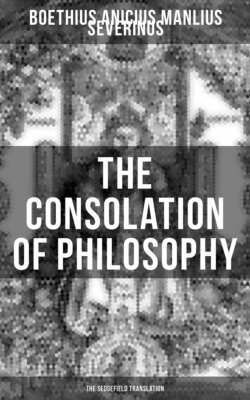Читать книгу THE CONSOLATION OF PHILOSOPHY (The Sedgefield Translation) - Anicius Manlius Severinus Boethius - Страница 5
На сайте Литреса книга снята с продажи.
III
ОглавлениеTable of Contents
When I had sung thus plaintively, saith Boethius, there entered unto me divine Philosophy, who, addressing words of greeting to my mournful friend, said, ‘Art thou not the man that was once nourished and taught in my school? Then how comes it that thou art thus grievously oppressed with these worldly sorrows? Unless, methinks, thou hast too soon forgotten the weapons that once I gave thee.’ Then, lifting up her voice, she cried, ‘Depart from the mind of my servant, ye worldly cares accursed, for ye are the worst of foes, and suffer him to return again to my teachings.’ And she drew nearer unto my grieving intelligence, saith Boethius, and raised it up somewhat from its prostrate state; then, drying its eyes, she asked it cheerily whether it knew again its foster-mother. With that the Mind turned towards her and forthwith clearly recognized his own mother, that same Philosophy that long before had trained and taught him. And perceiving that the mantle of her doctrine was much rent and torn by the hands of foolish men, he asked her how this came about. And Philosophy made answer and said that her disciples had torn her thus, being minded to possess her altogether. But of a truth they will gather much folly by their presumption and vainglory unless every one of them shall turn again to her healing care.
Here Philosophy began to take pity on the Mind’s feebleness, and fell to singing, and these were her words: ‘Ah, how deep the pit in which the mind labours when it is assailed by the hardships of this life! If it forget its own light (that is, joy eternal), and press on to unfamiliar darkness (that is, the cares of this world), as this Mind now doth, naught else shall it know but sorrow.’
After that Philosophy, that is to say, the Spirit of Reason, had sung this song, she began again to speak, and she said to the Mind, ‘I see thou hast need of comfort rather than of woeful words. Wherefore, if only thou wilt show shame for thine error, I will soon begin to raise thee up and carry thee with me to heaven.’
‘What,’ answered the sorrow-stricken Mind, ‘and is this the boon and the reward thou didst always promise them that would obey thee? Is this wise Plato’s saw thou toldst me of long ago, that without righteousness no power was rightful? Dost thou mark how the righteous are hated and oppressed because they are resolved to do thy will, and how the unrighteous are exalted by reason of their misdeeds and their self-esteem? Even that they may do their wicked will the sooner, they are furthered with gifts and possessions. Therefore I will now call earnestly upon God.’
Then he began to sing, and these were the words of his song:
